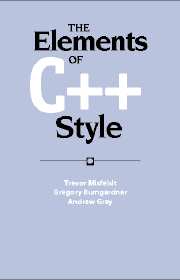
-
Select format
-
- Publisher:
- Cambridge University Press
- Publication date:
- 01 September 2009
- 16 February 2004
- ISBN:
- 9780511547027
- 9780521893084
- Dimensions:
- Weight & Pages:
- Dimensions:
- (175 x 115 mm)
- Weight & Pages:
- 0.16kg, 192 Pages
You may already have access via personal or institutional login
Book description
The Elements of C++ Style, first published in 2004, is for all C++ practitioners, especially for those working in teams where consistency is critical. Just as Strunk and White's The Elements of Style provides rules of usage for writing in the English language, this text furnishes a set of rules for writing in C++. The authors offer a collection of standards and guidelines for creating solid C++ code that will be easy to understand, enhance and maintain. The book provides conventions for:formattingnamingdocumentation programmingand packagingfor the latest ANSI standard of C++, and also includes discussion of advanced topics such as templates.
Reviews
‘The expansion of each entry is well done and from time to time extra bonus information nestles either in the main text or in a footnote … There are a few experts who would find nothing new in this book, but most of the rest of us would benefit from it … Buy a copy …’
Francis Glassborow Source: CVu
‘The Elements of Java Style is perfect in what it tries to achieve. Each rule is sensible, hardly any are debatable, and there is no excuse for ignoring any of them.’
Source: JavaZone Book of the Week
‘If you teach C++, I recommend you mention this book to your students. If you manage a group of C++ programmers, you should acquire one or more copies of this book, and circulate them among your people. If you manage a technical library, you should add this book to it … contains a great deal of good advice … In summary, this will be a good addition to a C++ programmer‘s library.‘
Source: Computing Reviews
‘It offers 175 pithy C++ style tips, covering everything from naming conventions to thread safety. The book would be most useful for development teams that want to use it as a resource for creating their own style guides.‘
Source: Computing Reviews
Contents
Metrics
Full text views
Full text views help Loading metrics...
Loading metrics...
* Views captured on Cambridge Core between #date#. This data will be updated every 24 hours.
Usage data cannot currently be displayed.
Accessibility standard: Unknown
Why this information is here
This section outlines the accessibility features of this content - including support for screen readers, full keyboard navigation and high-contrast display options. This may not be relevant for you.
Accessibility Information
Accessibility compliance for the PDF of this book is currently unknown and may be updated in the future.


